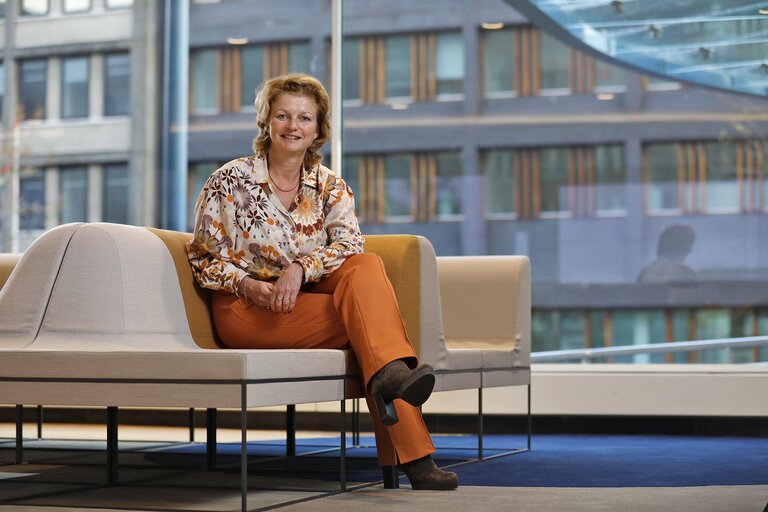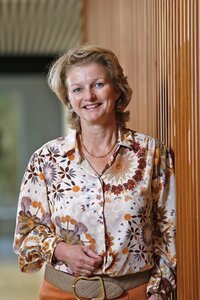
Marjan van Loon, President-Director Shell Netherlands: 'Shell Pernis and Moerdijk are key drivers of Shell's transformation'
Shell recently raised its CO2 targets for 2030 to 50 percent with the ultimate goal of 'zero' emissions in 2050. As far as Shell is concerned, 'everything on wheels' in the Netherlands runs climate-neutral as early as 2040. 'The plants in Moerdijk and Pernis play an important role in making that happen,' says Marjan van Loon, President and CEO of Shell.
'Splitting fossil and renewable operations? The fossil plants are crucial to make the transformation to a climate neutral company'"
That energy transition is defining Shell's future is a fact. Opinions are divided on how to get there. Just recently, shareholder and hedge fund Third Point let it be known that as far as they are concerned, Shell will separate its fossil and sustainable operations. Chief Executive Officer Marjan van Loon explains why that is absolutely not going to happen. 'Not only do we need the revenues from oil and gas to invest in alternative forms of energy. The fossil plants themselves are also crucial to make the transformation.'
Hardly a day goes by without Shell in the news and almost always related to the energy transition. Not surprising when you consider the impact Shell can potentially have to make the Dutch energy transition successful. 'Just the Skyline project at Shell Moerdijk, in which all the stoves are being renewed, directly reduces the CO2 footprint by 1 percent across the Netherlands,' said Marjan van Loon. Skyline is one of Shell Netherlands' many projects through which the company is working towards five goals within ‘Samen goed op weg’. Based on these goals, Van Loon takes us through the developments at Shell.
1. Mobility
'We are committed to having "everything on wheels" driving climate-neutral by 2040: from trucks to passenger cars. This involves an energy mix of bio-lng, biodiesel, hydrogen and electric driving. Just recently we opened a new bio-lng plant in Amsterdam.' She emphasizes that bringing the customer along in the sustainability effort is no easy task. 'If we as Shell offer sustainable alternatives, there has to be legislation prohibiting cheaper less sustainable fuels, for example. We therefore work together with the whole market and the government; we cannot do this alone.'
2. Renewable energy
'In addition, we want to be leaders in investments in renewable energy. This includes innovation in wind farms, solar parks, hydrogen and geothermal energy.' Examples include the NortH2 wind farm far above the Waddeneilanden and the green hydrogen plant on the Tweede Maasvlakte, which looks like it will be up and running in 2023. 'With a capacity of 200 MW, that will soon be the world's largest electrolyser powered by wind-on-sea. We will use the 50,000-60,000 kg of hydrogen that we will take per day initially to make the production of fossil fuels in Pernis partly sustainable. But the green hydrogen is ultimately intended, once there are enough hydrogen trucks, to make the heavy transport sector directly sustainable. Surely, it is a chicken-and-egg situation: do you start with enough hydrogen or with the production of enough transport vehicles that can run on hydrogen? By starting with the green-hydrogen plant, we are boosting the development of sustainable trucking: we can provide hydrogen for 2,300 trucks per day once the sector is ready. We are also building Shell H2 filling stations. Two new ones opened recently. I drive a hydrogen car myself, by the way. Under the passenger seat is a fuel cell that converts the hydrogen into electricity. The only thing left behind is a container of water.'
Does this mean Shell is no longer investing in fossil energy? 'We are the fastest runner in the industry internationally in terms of making the portfolio more sustainable. At the same time, it remains an energy transition: you do not put it all at zero at once. Certainly not in developing countries. There, the "tapping" of energy sources is equivalent to increasing prosperity, and fossil energy is often the primary concern. Our challenge is to guide those countries in this as best we can and advise them on sustainable alternatives. You have to remember that they would also make these investments without us and our knowledge, and in those cases they are not naturally included in the sustainable alternatives.'
3. Transformation Pernis and Moerdijk
The third goal is the transformation of Pernis and Moerdijk into energy and chemical parks. 'These plants are important drivers of Shell's transformation. Among other things, we need them to make the products of the future. In Moerdijk, for example, we use existing cracker technology to convert difficult-to-recycle plastics into their original building blocks, such as propylene and ethanol, which we can then use as raw materials in our chemical plants. We also use existing (refurbished) plants to make biofuels from animal waste. The goal is to use one-third of production waste streams as raw materials in Moerdijk by 2030.'
‘Old’ and ‘New’
'We see better than anyone else how "old" and "new" reinforce each other in our transformation,' Van Loon stresses. 'By combining old and new energy, we can bring down our CO2 emissions and those of customers and ensure a good economic return. We think this is ultimately better for shareholder value. Last but not least, because the employees at Shell Moerdijk and Pernis see that we are investing a lot in the plants, they know how important they themselves are to Shell's future.'
4. Learning from each other
'In addition, we invest in knowledge and skills. Learning from each other and others is paramount. The Shell Amsterdam Research Lab will therefore be renamed the Energy Transition Campus. An open campus where we want to collaborate with start-ups, scale-ups, research institutions, education and companies on solutions for cleaner energy. This is how we ensure that we can give our people the best knowledge and share our own knowledge widely. We also explicitly seek cooperation with the secondary vocational education (MBO) sector in this regard, so that we can give a boost to the labor market.'
Suppliers
'Part of our goal to increase knowledge and skills is to work much more collaboratively with our 2,700 suppliers. Together we need to form an ecosystem and value chain around the energy transition, similar to our shared safety culture. Suppliers, like Bilfinger Industrial Services, often know best themselves where they can make a difference. In turn, we can help them with our expertise in mobility and mobile equipment. Early next year we will therefore organize a major event around the subject for our suppliers.'
5. Transparency
Finally, Shell is going to invest more in transparent communication, says Van Loon. 'We are, of course, a very large international company; the choices we make around energy transition, for example, raise many questions. Moreover, there is a greater need for openness among citizens, you can also see that when you look at the need for a new governance culture in government.'
In short, ambition is high when it comes to energy transition. Does this mean that Shell will no longer be an oil and gas company in the future? 'In 30 years, the oil and gas part will already have been reduced enormously. We will focus much more on green molecules and green energy. In the Netherlands we are running pretty fast in that respect.'
Marjan van Loon
Marjan van Loon (55) was born in Helmond and studied Chemical Engineering at TU Eindhoven. She has worked for Shell since 1989, apart from a 7.5-year Australian adventure at Woodside Energy. She started as a gas processing technologist in Pernis, worked in Malaysia, among other places, and was vice president liquid gas for seven years. She has been President and CEO of Shell Netherlands since 2016.
Remarkably, Van Loon and her family form "a real tech family. 'I know my husband from TU Eindhoven and our children both did technical studies. My daughter studied Sustainable Energy Technology and now builds wind farms at Vattenfall and my son studied Molecular Science & Technology.' Especially with her daughter, climate and energy transition is a regular topic of conversation. 'Basically, we have the same agenda. But the outlook is different. I grew up emphasizing the economic significance of prosperity. For my daughter, prosperity is also naturally about biodiversity, well-being and equality.'

